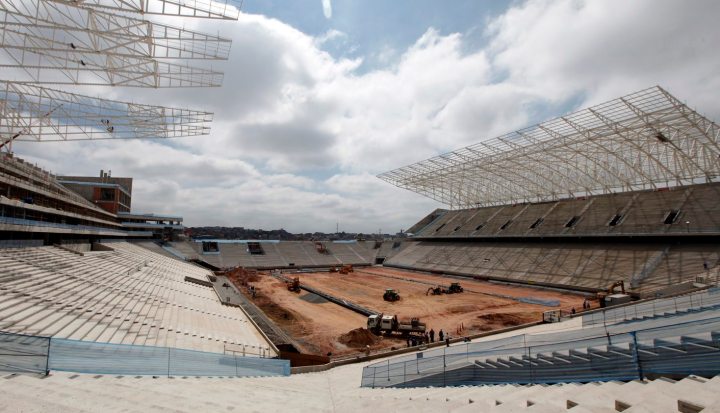Sport
Soccer: Brazil in the soup over stadium deadlines

Brazil is struggling to get its stadiums ready for both the Confederations Cup and the 2014 Soccer World Cup. While it’s a familiar old trick of the media to exaggerate the problems of countries preparing for global sporting events, this time Brazil really looks like it’s in the soup. By ANT SIMS.
Brazil has delivered only three of the six venues for the Confederations Cup – which is to start in June – and while over half a million tickets have already been sold, the country still has to finish the main stadiums to be used for the 2014 Soccer World Cup dress-rehearsal.
FIFA had initially demanded that the six stadiums be ready in December 2012, but due to construction delays, the sport’s governing body extended the deadline until 15 April. Still, even with the additional time, the stadiums won’t be ready.
Belo Horizonte, Fortaleza and Salvador have managed to meet their deadlines, and Recife will open its Arena Pernambuco on Sunday – one day ahead of the deadline set by Fifa.
The Mane Garrincha National Stadium is yet to be finished, though, and construction workers are scrambling to try and complete the project. Seats still need to be bolted into concrete galleries, and grass is yet to be played. The $500 million colonnaded arena in the centre is the most expensive of the 12 venues for the World Cup, but even with such an inflated budget, construction is far from completion.
Brazil is due to play Japan there in the opening match of the Confederations Cup, which will test the waters to see just how capable the country is of hosting global sporting events. It’s a capability that needs to be checked, with the World Cup scheduled for 2014 and the Olympic Games two years after that.
Officials insist that everything will be fine, though, and at the opening of the Fonte Nova stadium in Salvador last week, president Dilma Rousseff insisted that the country would “exceed expectations” in organising the global soccer tournament.
However, the expectations of a looming deadline and exaggerated costs are in stark contrast with the president’s comments. The Maracanã in Rio de Janeiro, the venue for the final of the Confederations Cup, is causing the biggest problem. It was one of the stadiums used for the 1950 World Cup and is currently undergoing the final finishing touches as part of a $400 million refurbishment, the third of its kind in the last 12 years.
Half of the 78,000 seats have been put in. The pitch has been laid, but the stadium’s roof is still undergoing work, and work hasn’t even begun on access areas.
The refurbishments were also due in December last year, but Brazil now says the earliest handover will be on 27 April. Some of Rio’s state officials have raised concerns about that deadline date, too, causing FIFA Secretary General Jerome Valcke to admit that preparations are not going according to plan.
“Not all operational arrangements will be 100%” for the Confederations Cup, Valcke wrote on FIFA’s website, warning that such delays would not be tolerated for the World Cup.
“The deadline for the FIFA World Cup stadiums delivery stands firm as December 2013. There will be no compromise,” he wrote. Valcke said the scale of next year’s World Cup required a minimum six-month operational set-up.
The stadiums are not the only issues Brazil face, either. Delays at airports and urban transport could result in a logistical catastrophe, with over three million visitors expected for the tournament.
Brazil’s World Cup preparations have been criticised several times by FIFA, including Valcke’s statement last year that the country needed “a kick in the backside.”
While it’s almost common practice for media reports to blow situations out of proportion when it’s not a first-world country hosting an event, things actually do look pretty dire for Brazil. South Africa had its fair share of problems in the lead-up to the hosting of the 2010 Soccer World Cup, but it never missed the deadlines by such large margins.
The Confederations Cup will be the biggest test for Brazil. FIFA requires new stadiums to be tested twice, preferably with soccer games. The first such test run at Maracanã will happen on 27 April, behind closed doors, when local World Cup organising committee members Ronaldo and Bebeto try out the field playing with a group of friends.
Just two weeks before the tournament is about to kick off, Brazil will host England in a friendly. The country started to err before construction had even started, since it took two years just to decide on which stadiums would be hosts in the global soccer tournament. Ronaldo, the Brazilian soccer legend, believes it’s a cultural issue.
“We leave everything to the last minute,” Ronaldo told O Globo newspaper on Sunday. “We’ve had since 2007 to get organised. We wouldn’t be under such pressure today if we had.”
If African time is a few hours delayed, then Brazilian time doesn’t even register on the clock – and FIFA will have to react quickly if the country fails to live up to the expectations set for the warm-up tournament in June. DM
Photo: A view of Arena Sao Paulo stadium, known as “Itaquerao”, which will host the opening match of the 2014 World Cup, in Sao Paulo April 11, 2013. REUTERS/Paulo Whitaker



















 Become an Insider
Become an Insider